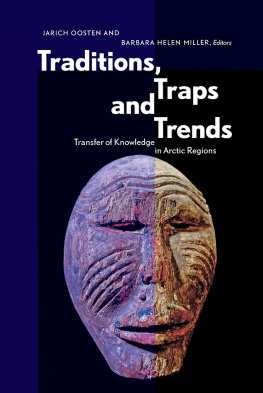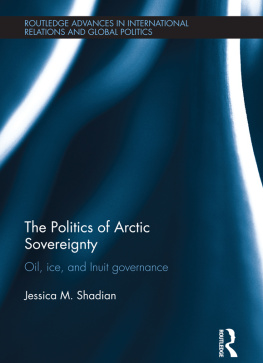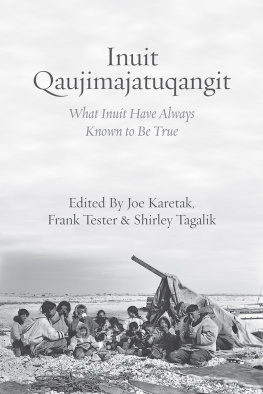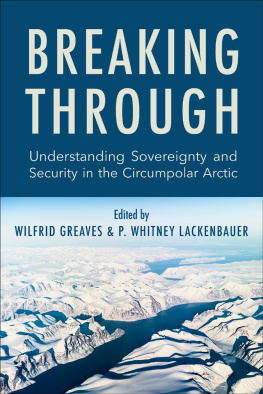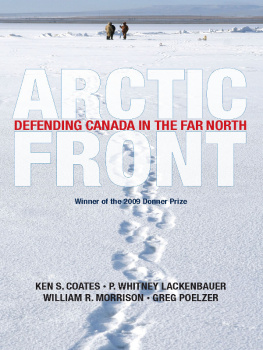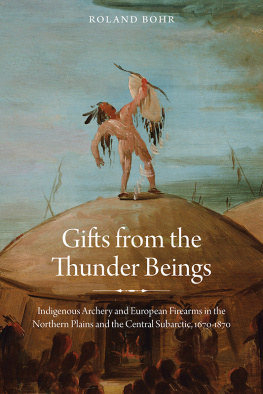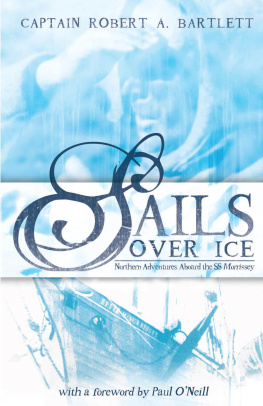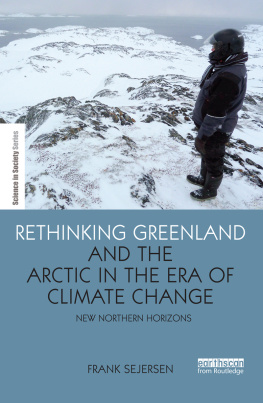Published by
The University of Alberta Press
Ring House 2
Edmonton, Alberta, Canada T6G 2E1
www.uap.ualberta.ca
Copyright 2018 The University of Alberta Press
LIBRARY AND ARCHIVES CANADA CATALOGUING IN PUBLICATION
Traditions, traps, and trends : transfer of knowledge in Arctic regions / Jarich Oosten and Barbara Helen Miller, editors.
Includes bibliographical references and index.
Issued in print and electronic formats.
ISBN 9781772123722 (softcover). ISBN 9781772124026 (PDF). ISBN 9781772124033 (EPUB). ISBN 9781772124040 (Kindle)
1. Knowledge, Theory ofCross-cultural studies. 2. Traditional ecological knowledge. 3. Oral tradition. 4. InuitCanada. 5. InuitGreenland. 6. Sami (European people)Scandinavia. I. Oosten, J.G., 1945, editor II. Miller, Barbara Helen, 1949, editor
GN451.T73 2018 | 306.42 | C20189010665 |
C20189010673 |
First edition, rst printing, 2018.
First electronic edition, 2018.
Digital conversion by Transforma Pvt. Ltd.
Copyediting and proofreading by Brian Mlazgar.
Indexing by Stephen Ullstrom.
Book design by Alan Brownoff.
All rights reserved. No part of this publication may be reproduced, stored in a retrieval system, or transmitted in any form or by any means (electronic, mechanical, photocopying, recording, or otherwise) without prior written consent. Contact the University of Alberta Press for further details.
The University of Alberta Press supports copyright. Copyright fuels creativity, encourages diverse voices, promotes free speech, and creates a vibrant culture. Thank you for buying an authorized edition of this book and for complying with the copyright laws by not reproducing, scanning, or distributing any part of it in any form without permission. You are supporting writers and allowing the University of Alberta Press to continue to publish books for every reader.
The University of Alberta Press gratefully acknowledges the support received for its publishing program from the Government of Canada, the Canada Council for the Arts, and the Government of Alberta through the Alberta Media Fund.

IN MEMORY OF JARICH GERLOF OOSTEN (19452016)
This book is dedicated to the memory of Jarich Gerlof Oosten, who died suddenly on May 15, 2016, when the publication of this book had reached its final phase. Jarich was a co-founder of the Research Group Circumpolar Cultures, and played a pivotal role in the groups projects, acting as its inspiration, motivator, chairman, secretary, spokesman and its internal critic, depending on the circumstances. As a man of original insights, a revealer of invisible connections in social (Inuit) life, as a man of true knowledge and wisdom who demanded the highest scientific standards of himself and others, and who never accepted a premature or unfounded interpretation, his inspiring presence is, and will be, greatly missed. But we are very grateful to have known him, and to have had him in our midst, for so many fruitful years.
Willem C.E. Rasing
Research Group Circumpolar Cultures
Contents
JARICH OOSTEN and BARBARA HELEN MILLER
Notes on isumaqsajuq, ilisaijuq, and qaujimajatuqangit
WILLEM C.E. RASING
A Transfer of Knowledge in the 18th Century
THEA OLSTHOORN
Social Aspects of the Transfer of Inuit qaujimajatuqangit
FRDRIC LAUGRAND and JARICH OOSTEN
KIM VAN DAM
The Transfer of Knowledge through East Greenlandic Material Culture
CUNERA BUIJS
A Case Study of the Coastal Smi
BARBARA HELEN MILLER
NELLEJET ZORGDRAGER
The Kautokeino Rebellion and Its Aftermath
NELLEJET ZORGDRAGER
Introduction
JARICH OOSTEN and BARBARA HELEN MILLER
Discourses in Anthropology
One of the preconditions to making a place in scientific discourse for contributions from Indigenous authorities is the diversification of the categories and formulations that Western scientists have decided qualify as science. We can all too easily fall into scholarship on traditional knowledge employing simplistic dichotomies regarding our ways of thinking (i.e., that of Western scientific investigation) vs. their way of thinking (i.e., that of Indigenous elders or authorities of other kinds) (DuBois 2011: 543). Such dichotomies actually work to exclude Indigenous thought and make it exotic, even while showcasing it as insightful or intriguing. Watson-Verran commented on this:
By and large, past cross-cultural work has taken Western rationality and scientificity as the benchmark criteria by which other cultures knowledge should be evaluated. So-called traditional knowledge systems of indigenous peoples have frequently been portrayed as closed, pragmatic, utilitarian, value-laden, indexical, context-dependent, and so on, implying that they cannot have the same authority and credibility as science because their localness restricts them to the social and cultural circumstances of their production. (Watson-Verran and Turnbull 1995: 11516)
We must not reinstate the definition and employment of science that repudiates the personal point of view, nor construct theories quite careless of their bearing on human anxieties and fates (discussed in James 1902: para. 491). What the diversification in formulations of Western science means for anthropology is the need to go beyond the Cartesian paradigm that mind and body are essentially separate entities (see Mehta 2011), and to discard the evolutionary component of Lvy-Bruhls participation mystic, while acknowledging that participation is a key aspect of meaning-construction in all cultures that is also called embodiment (see Shore 1996: 183). Another proposed requirement in the study of traditional knowledge is the replacement of binary logic (more/less; true/false) with dialectical logic (the dialogue with), which allows for more holistic interpretations, and for more attention to process (see Mills 2000; Clifford 1997; Sahlins 1999), which can include the withholding of denotative meaning (Briggs 1996: 220). Clearly, then, knowledge ofand knowledge generated byperformance is included.
In Arctic communities, Western and non-Western values and knowledge are visibly in conflict, but in todays Arctic, these are also often combined. We hope in this book to shed light on various types of knowledge, how these circulate and can be combined, and how they are applied and used at various levels in Arctic communities. Examining a variety of transfers of knowledge practices, the contributions in this volume show the significant relationships Arctic peoples maintained in the past and continue to maintain. We proceed from the data that emerges in the course of research, to ensure that we remain in the field. In the field there are ideas about tradition, there are bodies of knowledge, and an understanding of what occurs during the transfer of knowledge, which, we endeavour to show, can be both creative of, and facilitative for, knowledge.
Diversifying the formulations of Western science in order to open up the discourse is pertinent to objections voiced by Arctic peoples concerning transfer of knowledge practices. The consistent objection voiced by local Arctic communities to the practice at residential schools is that the prioritized values employed by the school are not those held by the community. The knowledge that is considered by the local community as being important to transfer includes an attitude that encourages perceptual rather than judgemental forms of knowing, which lead to a life oriented towards service to community (see Vieten and Scammell 2015). Successfully transferring an attitude is of course not a mechanical act, nor is it achieved by instruction. Rather, it is more similar to Ingolds view on growing (discussed in Ingold 2011: 11), wherein an attitude is nurtured and developed. In addition to the importance assigned to transferring the knowledge of values by Arctic communities, is their attentiveness to more of the same quality (James 1902: para. 510), which one needs to come into a harmonious working relation. More of the same quality is William Jamess apt description of a greater part of oneself that is conterminous and continuous with a more of the same quality in the lived world, operating both beyond and within each person. For Arctic communities there are numerous experiences of/with a more of the same quality that require attentiveness: there is a meeting in prayer, in connection to a guardian spirit, at a location, through a name. These significant relationships, for the most part, are transferred through the sharing of stories, and include experiences that took place out on the land. Hence, transfer of knowledge can have the character of an initiation, of being brought into the story.
Next page
